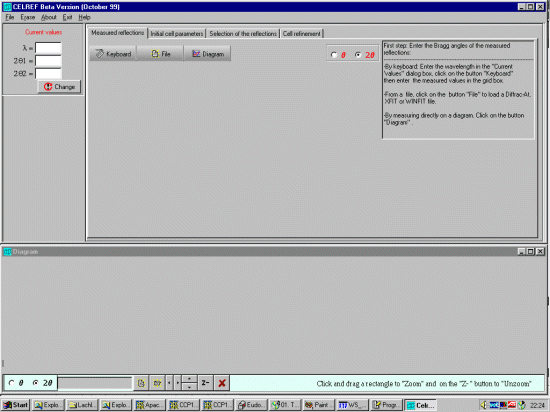
CELREF: Graphical Unit Cell refinement.
7th September 1999 E-mail from Jean Laugier
"Generally I should like to make some remarks about the cell parameters measurements:
-The precision of the refinement of the cell parameters are not
proportionnal to the number of peaks treated by the program. It is always
better, when it is possible, to use peaks above 45°, mainly because the
vertical divergence changes at this value. For a cubic structure, for
example, it is better to measure only one peak at the maximum Theta angle
than to use Celref with a lot of peaks, if the zero shift is weak or known!
-In the Least Square method it is assumed that the errors are random and in
an experimental diagram the errors are totally systematic! It is necessary
to be suspicious about the parameters precisions given by the program.
-The mathematical method does not work very well with cubic structures, if
the starting a value is very different of the true value. it is always
better to refine the zero shift in this case. (The batch bersion works in
ILL since 20 years and nobody saw that! Probably they never refine cubic
cells!).
Perhaps it would be necessary to make a special algorithm for the cubic case..."
| WARNING: The following tutorial was done before Jean's above advice. The main purpose of this tutorial is to show how to interact with Celref. Thus the following tutorial may be non-optimal in terms of how you would handle a CUBIC material in reality. |
| CELREF can be obtained off the web at the the LMGP (Laboratoire des Materiaux et du Génie Physique de l'Ecole Supérieure de Physique de Grenoble http://www.inpg.fr/LMGP/) program suite site at http://www.ccp14.ac.uk/ccp/web-mirrors/lmgp-laugier-bochu/ |
|
The example data file is of a cubic Y2O3 sample.
|
|
Click on the CELREF icon or run the program via the windows explorer/windows file manager to
bring up the CELREF starting interface.

|
|
You can then open a Powder diffraction data file using either the
File, Open, Profile menu option or the the bottom left
hand set of ICONs (Celref can presently use Siemens/Bruker RAW, CPI or RIET7 DAT
raw datafiles). In this case we open a Y2O3.dat file. CELREF will prompt for
the Wavelength of the peak file. Select Other and type in the wavelength: 1.54056
Angstrom (Cu k Alpha 1)
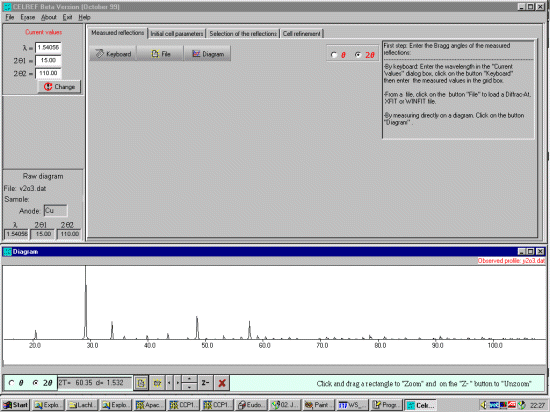
|
|
Either type the reflections in by hand or open a peak find/peak profile file
either via the File, Open, Peaks File or the ICON under the Measured Reflections tab.
The peaks will be displayed on the bottom window. (Celref can presently import Siemens/Bruker DIF,
Winfit *.DAT, or XFIT *.TXT peak find/peak profile output files). If loading an XFIT or related file
(in this case a y2o3.txt XFIT peak profile file),
when prompted for wavelength select OTHER and confirm the
wavelength being used (1.54056 Angstrom) and continue.
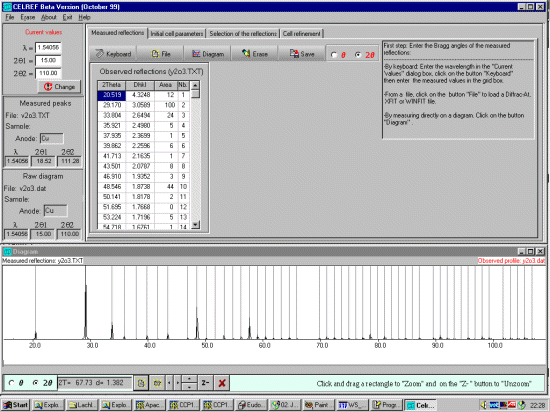
|
|
Select the Initial Cell Parameters tab. Input the (approximate) Cell, Spacegroup and calculation range information then press the Calc Button to generate the HKL listing. It is also possible to load this from a file if this information exists. Just click the File tab under the "Selected" Initial Cell Parameters tab which is done here (the y2o3.cry cell and spacegroup information file).
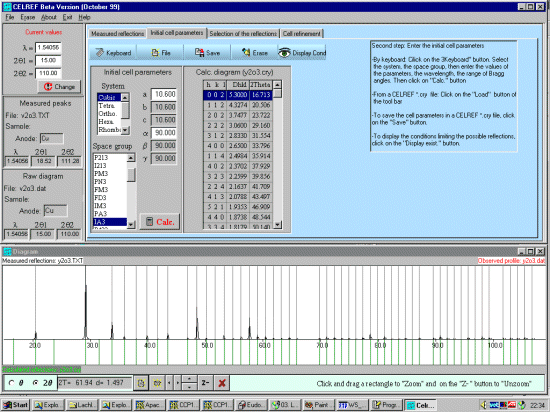
|
|
Select the Selection of the Reflections tab. To select the corresponding peaks, this can be done manually or automatically (with a controllable angular tolerance). Click on the Automatic Selection button to automatically select the corresponding peaks. Check both the top peak list and the bottom graphical representation to see that the selection has occured appropratiately. Peaks can be added or deleted manually. Be careful to check that Celref hasn't duplicated HKLs due to poor quality input data.
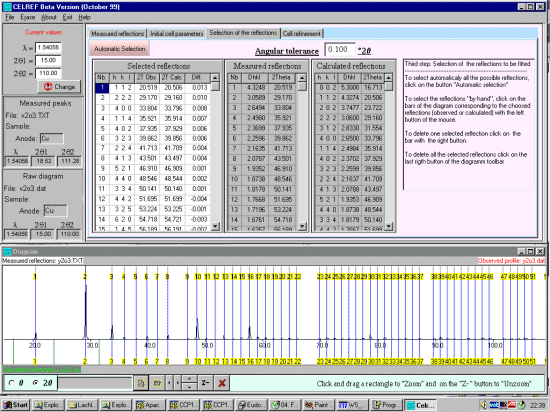
|
|
Select the Cell Refinement tab. At this point, recheck that the wavelength is correct, CELREF may be using the average alpha wavelength when you are profiled the peaks on the Alpha-1 wavelength. If you wish to change the wavelength, you can do this in the top left Current Values option area and click on the Red Change button. Click on the Compute button to perform the unitcell refinement. Two-theta offset can also be refined. If you click on this, Celref will prompt whether you wish to use model a constant zero shift or a sample exentricity. If you keep the unitcell constants at known values, the wavelength can be refined.

|
|
You can see all the results in a file using the Print ICON. Which is
normally outputted in a file called celref.out
----------------------------------------------------
No Title
----------------------------------------------------
Number of reflections : 52
Max. number of refinement cycles 10
Refinement constraints : A=B=C
Initial values :
Zero Lambda a b c alpha beta gamma
.00000 1.54056 10.6009 10.6000 10.6000 90.00 90.00 90.00
1. 0. 1. 0. 0. 0. 0. 0.
Recipr.lattice : .0943 .0943 .0943 90.00 90.00 90.00
Volume (a**3) : 1191.113
Number of refinement cycles : 2
Final values : (Standard errors on 2nd line)
Zero Lambda a b c alpha beta gamma
.00034 1.54056 10.6038 10.6038 10.6038 90.00 90.00 90.00
.00003 .00000 .0000 .0000 .0000 .00 .00 .00
Recipr.lattice : .0943 .0943 .0943 90.00 90.00 90.00
Volume (a**3) : 1192.297
H K L 2Th(obs) 2Th-Zero 2Th(Calc) diff.
1 1 2 20.519 20.519 20.518 .000
2 2 2 29.170 29.170 29.168 .001
4 0 0 33.804 33.804 33.803 .001
1 1 4 35.921 35.921 35.920 .001
4 0 2 37.935 37.935 37.934 .001
3 2 3 39.862 39.862 39.861 .001
2 2 4 41.713 41.713 41.713 .000
4 1 3 43.501 43.501 43.500 .001
5 2 1 46.910 46.910 46.910 .000
4 4 0 48.546 48.546 48.545 .001
3 3 4 50.141 50.141 50.140 .001
4 4 2 51.695 51.695 51.698 -.004
3 2 5 53.224 53.224 53.224 .000
6 2 0 54.718 54.718 54.720 -.002
1 4 5 56.189 56.189 56.188 .000
2 2 6 57.632 57.632 57.632 .000
1 3 6 59.052 59.052 59.053 -.001
4 4 4 60.453 60.453 60.453 -.001
3 4 5 61.833 61.833 61.835 -.002
6 0 4 63.195 63.195 63.198 -.003
3 6 3 64.541 64.541 64.545 -.005
6 2 4 65.875 65.875 65.878 -.003
6 1 5 69.798 69.798 69.796 .001
0 8 0 71.079 71.079 71.080 -.001
4 5 5 72.353 72.353 72.354 -.001
4 4 6 73.618 73.618 73.619 -.001
6 3 5 74.874 74.874 74.875 -.002
6 0 6 76.123 76.123 76.125 -.002
4 7 3 77.368 77.368 77.367 .000
6 2 6 78.603 78.603 78.604 -.001
2 7 5 79.838 79.838 79.835 .003
0 8 4 81.061 81.061 81.062 -.001
8 3 3 82.284 82.284 82.284 .000
8 4 2 83.503 83.503 83.503 .000
5 6 5 84.721 84.721 84.719 .002
6 4 6 85.933 85.933 85.932 .001
5 7 4 87.148 87.148 87.144 .004
3 6 7 89.567 89.567 89.564 .003
4 4 8 90.775 90.775 90.773 .002
8 5 3 91.983 91.983 91.983 .000
6 8 0 93.193 93.193 93.193 -.001
7 2 7 94.405 94.405 94.405 -.001
6 8 2 95.619 95.619 95.619 -.001
3 9 4 96.837 96.837 96.836 .001
6 6 6 98.057 98.057 98.055 .001
5 6 7 99.282 99.282 99.279 .003
5 5 8 101.740 101.740 101.739 .001
4 6 8 102.980 102.980 102.977 .003
1 9 6 104.220 104.220 104.221 -.001
10 4 2 105.470 105.470 105.472 -.002
7 8 3 106.730 106.730 106.731 -.001
9 3 6 109.280 109.280 109.274 .006
Sqrt(Sum(Th O-C)**2)/(Nref-Npar)) = .000277
Sqrt(Sum(2Th O-C)**2)/(Nref-Npar)) = .000138
|